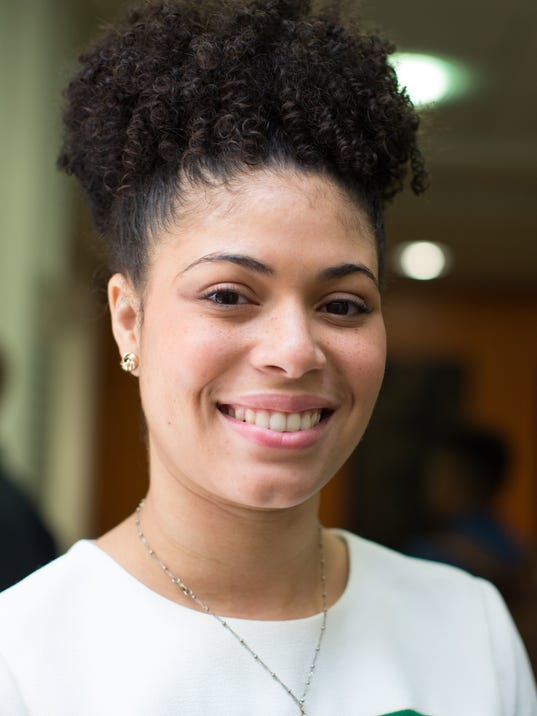By Erin Keith, Detroit Free Press
I received the news about Brennan Walker while I was at a leadership retreat of sorts for youth-justice advocates of color. The four-day forum was a “safe space” for us to talk about our advocacy work and uplift one another, while also discussing what it feels like to fight for black and brown kids in places where we are often a minority: the conference rooms where we, as unofficial representatives of the POC (people of color) delegation, have our figurative seats at the table, but not a voice; the spaces where fancy degrees, expensive surveys and academic studies often carry more weight than our lived experiences.
As I sat at the breakfast table with juvenile public defenders, children’s rights lawyers and community organizers, another article rolled across my Facebook timeline. Brennan, a 14-year-old black teen in a Michigan suburb, missed the bus and got lost walking the four miles to his school. He knocked on the door of a white lady’s house to ask for help. She cried “break in,” despite Brennan’s explanation that he just needed directions. Her husband ran to the front door with his shotgun, struggled to remove the safety for only a moment, and then stepped onto his porch where he fired a bullet at the fleeing child. Brennan sprinted away, narrowly escaping his own murder and future as an R.I.P. hashtag. The husband was charged with assault with intent to murder. 
As a black woman born and raised in Detroit, I couldn’t stop thinking about how Brennan could easily be one of my little cousins who are about his age. And while this story is heartbreaking, it is even more tragic for another reason — it has pretty much happened before.
Mike Thompson: Students march to end gun madness
Nancy Kaffer: In search of good schools, and drowning in data
In 2013, Renisha McBride, another black teen, knocked on a stranger’s door in a predominantly-white Michigan suburb asking for help. Renisha had just been in a bad car accident, and had wandered away from the scene on foot, injured and disoriented.
After knocking on a stranger’s door to request assistance, Renisha was met with the barrel of a shotgun. Only she didn’t run, she died — from a gunshot wound to the face, through a screen door, at point-blank range. Renisha’s killer, Theodore Wafer, was actually convicted of second degree murder — a most uncommon result when it comes to black victims at the hands of white shooters.
Yet, here we are again, with another black teen narrowly dodging a similarly tragic fate. Shortly after Brennan’s encounter, the Detroit Branch of the NAACP, issued a statement about the incident entitled “Being Black is not a Crime.” While I long for this phrase to be true, a quick review of our nation’s history proves that being black in America has always been, and continues to be, a crime.
From fugitive slave laws and slave patrols, to vagrancy laws, black codes and chain gangs, to a black boy named Emmett or Trayvon — our country has consistently made being black a crime, often punishable by death. So much so that a regular, shmegular white man thinks he can go shooting at a black boy on his lawn on a typical weekday morning and then go back to his life in retirement as if nothing ever happened.
Brennan is alive to tell his version of events because he ran fast. His character has not been annihilated by the media … because he ran fast. His actions cannot be mischaracterized as hostile and threatening…because he ran fast. The white homeowners can’t say they feared for their lives or make up some other cover-up story…because he ran fast.
A 14-year-old black boy should not have to be a mix of Olympian-sprinter Usain Bolt and superhero Luke Cage to make it to his 15th birthday. His life — his humanity — should not depend on him, literally, running faster than a speeding bullet. But sadly, in America today, it does.
And so in the midst of proudly teaching our black youth to know their rights, and to march, and to embrace their #blackboyjoy and #blackgirlmagic, and to be proud Wakandans — if we want them here and not just in handcuffs or in heaven — we apparently must also teach them:
Not to sell bootleg CDs.
Not to play with a toy in the park.
Not to have a busted taillight.
Not to forget the turn signal.
Not to go to the corner store for some skittles.
Not to wear hoodies.
Not to play their music loud.
Not to have a car accident.
Not to talk on their cell phones in their grandma’s backyard.
Not to get lost on their way to school.
Not to ask their neighbors for help.
Not to wait for a friend at Starbucks.
Not to sit in a car in a Walmart parking lot.
Oh, and how to run like their lives depend on it, because they probably do.
 I guess I need to thank my mom and dad for encouraging me to run the 300-meter hurdles in high school. My latent track and field skills might just be the thing that saves my black life.
I guess I need to thank my mom and dad for encouraging me to run the 300-meter hurdles in high school. My latent track and field skills might just be the thing that saves my black life.
Erin Keith, Esq. is native Detroiter who serves as the Juvenile Defense and Policy Fellow at Georgetown’s Juvenile Justice Initiative in Washington, D.C.



